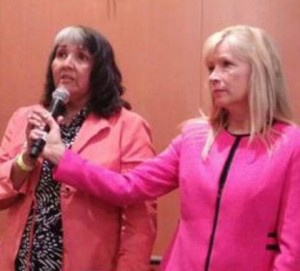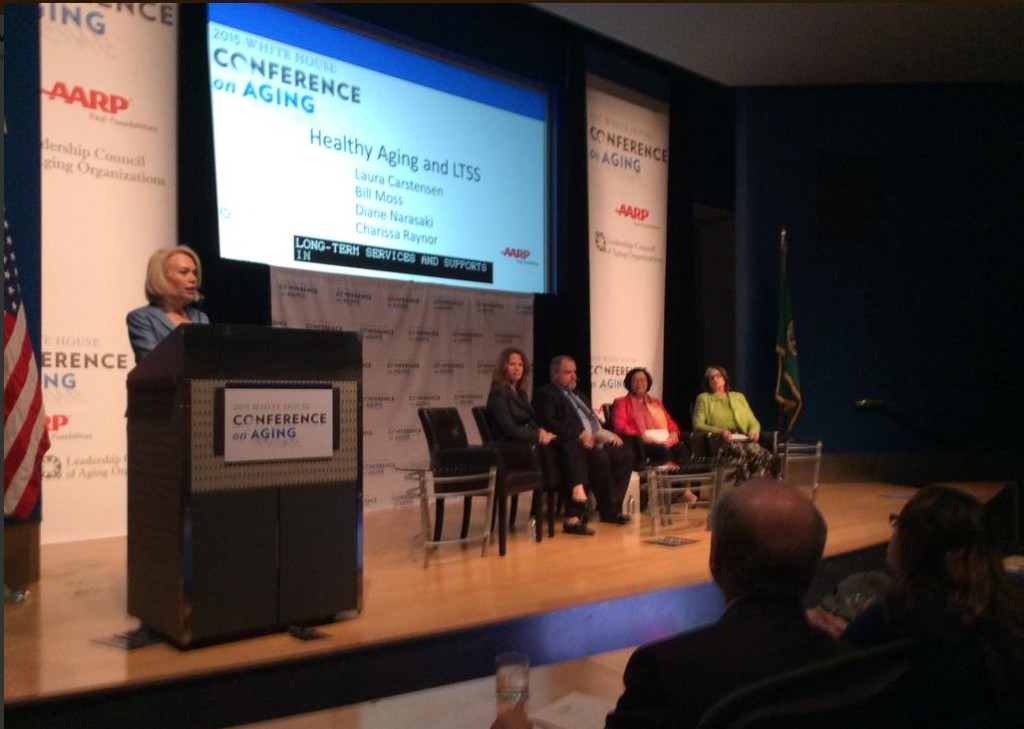On April 2, the White House Conference on Aging hosted its third in a series of five Regional Forums in Seattle, WA at the Bell Harbor International Center. With our member organization the National Asian Pacific Center on Aging a hop, skip, and a jump away in downtown Seattle, and a diverse elder population in the city and region that includes significant tribal populations, the Diverse Elders Coalition identified this Regional Forum as a key opportunity to lift up the profile of its member groups and the constituencies we all serve.
Approximately 200 people attended the Forum, which opened up with presentations from high profile speakers. King County Executive Dow Constantine welcomed the participants to the city, and Senator Patty Murray received a standing ovation as she took the stage to talk about her work at the federal level to maintain services for aging populations. Congressmembers Jim McDermott and Suzan DelBene addressed the audience, and U.S. Labor Secretary Tom Perez gave both a comprehensive breakdown of the legal and policy landscape of caregivers and workers in the aging space as well as stirring personal reflections of what it means to ensure older Americans are able to live with dignity and continue to contribute to the public good. Jo Ann Jenkins, the CEO of AARP, co-sponsor of the White House Conference on Aging, noted that “We are a generation of makers and doers who have a desire to celebrate discovery over decline.”
 In the afternoon, participants joined four different breakout groups corresponding with the four areas of focus for WHCOA — Healthy Aging, Retirement Security, Long-Term Services and Supports, and Elder Justice. Our own Jenna McDavid joined the Long-Term Services and Support breakout, and I was able to take part in the Elder Justice breakout. In smaller group discussions, I talked about how our work focused on the different ways in which the discriminations that our constituencies face — whether it’s racism, xenophobia, homophobia, or other types of bigotry — intersect with age to create unique “strains” of elder abuse that are not sufficiently addressed by current policies and initiatives. I was asked by WHCOA staff and planning partners to take the overall recommendations put forth by our breakout group to the larger audience during the final wrap-up. NICOA board member Cyndi Nation was one of the audience members, and Lora Church, a NICOA partner in Albuquerque gave a native address to the audience during the open discussion portion and connected it to a stirring reminder to keep the focus on the elders we serve and the need to respect them and to respect aging more generally.
In the afternoon, participants joined four different breakout groups corresponding with the four areas of focus for WHCOA — Healthy Aging, Retirement Security, Long-Term Services and Supports, and Elder Justice. Our own Jenna McDavid joined the Long-Term Services and Support breakout, and I was able to take part in the Elder Justice breakout. In smaller group discussions, I talked about how our work focused on the different ways in which the discriminations that our constituencies face — whether it’s racism, xenophobia, homophobia, or other types of bigotry — intersect with age to create unique “strains” of elder abuse that are not sufficiently addressed by current policies and initiatives. I was asked by WHCOA staff and planning partners to take the overall recommendations put forth by our breakout group to the larger audience during the final wrap-up. NICOA board member Cyndi Nation was one of the audience members, and Lora Church, a NICOA partner in Albuquerque gave a native address to the audience during the open discussion portion and connected it to a stirring reminder to keep the focus on the elders we serve and the need to respect them and to respect aging more generally.
Nora Super, WHCOA Executive Director, and Kathy Greenlee, Administrator for the Administration for Community Living, took the opportunity to observe Seattle’s aging community up close and recognize its diversity by visiting with the city’s Asian American and Pacific Islander community. In collaboration with the White House Initiative on Asian Americans and Pacific Islanders (WHIAAPI), WHCOA and ACL staff visited with the seniors at the Asian Counseling and Referral Service, one of the region’s largest multi-service agency. Many of these seniors are involved with the National Asian Pacific Center on Aging, and their new CEO, Dr. Wesley Lum, joined ACRS staff and other local AAPI advocates in a more policy and solutions oriented discussion with the WHCOA and ACL team. Having worked with ACRS for over fifteen years, including five years at an organiztion led by the sister of ACRS Executive Director Diane Narasaki, it was rewarding to see Seattle’s AAPI community give the White House specific and substantive feedback on the implications its work has on the real lives of Seattlites who don’t often get to be heard.

Diane Narasaki also served as a speaker at the WHCOA Regional Forum, and her points on Healthy Aging resonated with many of the points we have put forward in our DEC Principles of Inclusion and Engagement for the White House Conference on Aging in order to address the unique and often severe hardships diverse elders face. But echoing other calls during the Forum to reframe aging from more strengths-based perspectives instead of through deficit models, she closed by saying, “I believe that every challenge is an opportunity, and together, we can create systems to support healthy aging.” It’s that spirit that we bring with us as we engage the White House and our member organizations’ local constituencies in Cleveland and Boston for upcoming WHCOA Regional Forums. Keep track of that work on our blog, or on social media via Facebook and Twitter.
The opinions expressed in this article are those of the author and do not necessarily reflect those of the Diverse Elders Coalition.


